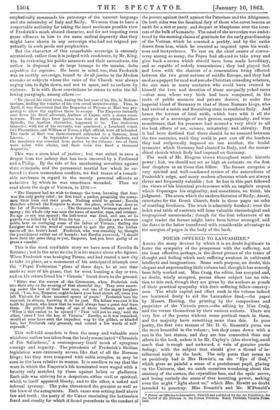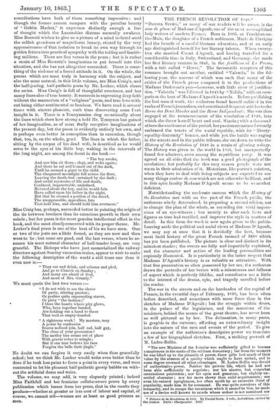POEMS OFFERED TO LANCASHIRE.*
AMONG the many devices by which it is no doubt legitimate to foster the sympathy of the prosperous with the suffering, not the least effective, perhaps, is the direct picture of the trains of thought and feeling which such suffering awakens in cultivated intellects and imaginations. Some such purpose, no doubt, this elegant and unpretending little volume had, though it has scarcely been fully worked out. Miss Craig, the editor, has accepted and, no doubt, wisely accepted, poems whose subject has no rela- tion to this end, though they are given by the authors as proofs of their practical sympathy with their suffering fellow-country- men. The whole capital and effort sunk in the volume indeed are bestowed freely to aid the Lancashire fund,—the paper by Messrs. Herring, the printing by the compositors and proprietor of the Victoria press,—the editing by Miss Craig, and the verses themselves by their various authors. There are very few of the poems without some poetical touch in them, and the majority have something more than this. In pure poetry, the first two stanzas of Mr. D. G. Rossetti's poem are the most beautiful in the volume ; but they come down with a run in the last stanza, and they are less connected than any others in the book, unless it be Mr. Cayley's (also showing, amid much that is rough and awkward, a vein of genuine poetic feeling), with the subject that should give a thread of in- tellectual unity to the book. The only poem that seems to us positively bad is Mrs Howitt's, on the "Eye of God," which gives so painful a sense of a protuberant pupil, glaring on the Universe, that we catch ourselves wondering about the anatomy of the cornea, the crystalline lens, and the optic nerve, and losing entirely the sense of that besetting power, making even the night "light about us," which Mrs. Howitt no doubt intended to pourtray. Miss Rossetti's and Mr. M'Donald's * Poem: an Offering to Lancashire. Printed and published for the Art Exhibition, for the Relief of the Distress in the Cotton Districts. Emily Falthfull, Victoria Press. 1565. contributions have both of them something impressive ; and though the former cannot compare with the peculiar beauty of '• Goblin Market," it expresses distinctly enough a line of thought which the Lancashire distress naturally awakens. Miss Rossetti wishes to give us a picture of a mind isolated amid the selfish grandeurs of magnificent luxury, stirred by the very oppressiveness of that isolation to break its own way through its golden fetters into practical sympathy with the toiling and famish- ing millions. There are fine verses in the pcem ; but it is rather a strain of Miss Rossetti's imagination to put herself into this situation, and she has not altogether succeeded. There is some- thing of the violence of a forced attitude in it. On the whole, the poems which are most truly in harmony with the subject, and also the most natural, in this little volume, are Miss Craig's, and the half-jesting, half-pathetic poem by Mr. Locker, which closes the series. Miss Craig's is full of thoughtful sweetness, and has many lines also of true beauty. It succeeds in expressing deep faith -without the mannerism of a "religious" poem, and true love with- out being either sentimental or luscious. We have read it several times with sincere pleasure, each time discovering some feesli insight in it. There is a Tenyysonian ring occasionally about the lines which show how strong a bold Mr. Tennyson has gained of her imagination, as of most featly receptive imaginations of the present day, but the poem is evidently entirely her own, and is perhaps even better in conception than in execution, though that, too, is, on the whole, good. The lines in which the father, sitting by the corpse of his dead wife, is described as he would seem to the eyes of his little boy, waking in the intervals of the long night, are among the finest in the book :—
"The boy awoke, And saw him sit there ; slept, and woke again ; And there he sat and loomed out of the dark, Until he seemed a giant to the child.
The chequered moonlight fell across the floor, Leaving the death-bed curtained by the dark ; And awful mysteries of life and death, Confused, impenetrable, undefined, Hovered about the boy, and he would fain Have called upon his father in the night, But that he seemed a portion of the dread, The unappeasable, appealless, fate That held him, and should hold him evermore."
Miss Craig has, perhaps, succeeded better in painting the origin of the tie between brothers than its conscious growth in their own minds ; but her poem is the most genuine intellectual effort in the book, and the most closelyconnected with its proper theme. Mr. Locker's final poem is one of the best of his we have seen. One or two of the jests are a little forced, as they are now and then wont to be ; but some are good, and the last verses, where he as- sumes his most natural character of half-tender irony, are very graceful. The Bishops who have just memorialized the railway directors against Sunday excursion trains, appear to wish to make the following description of the world a still truer one than it
even now is:— "They eat and drink, and scheme and plod, And go to Church on Sunday;
And many are afraid of God, And more of Mrs. Grundy."
We must quote the last two verses :—
4, I do not wish to see the slaves Of party, stirring passion;
Or psalms quite superseding staves, Or piety "the fashion ;" • I bless the hearts where pity glows, Who, here together banded, Are holding out a hand to those That wait so empty-handed.
"A righteous work! My masters, may A jester by confession Scarce noticed join, half sad, half gay, The close of your procession ? The motley hue seems out of place With graver robes to mingle ; But if one tear bedews his face Forgive the bells their jingle."
No doubt we can forgive it very easily when thus gracefully asked ; but we think Mr. Locker would write even better than he does if he took less pains to force a point in every verse, and were contented to let his pleasant half-pathetic gossip babble on with- out the artificial dams and weirs.
The volume, we may add, is very elegantly printed; indeed Miss Faithfull and her feminine collaborateurs prove by every publication which issues from her press, that in the results they produce—whether at greater or less cost of labour and capital, of course, we cannot tell—women are at least as good printers as .men.































 Previous page
Previous page